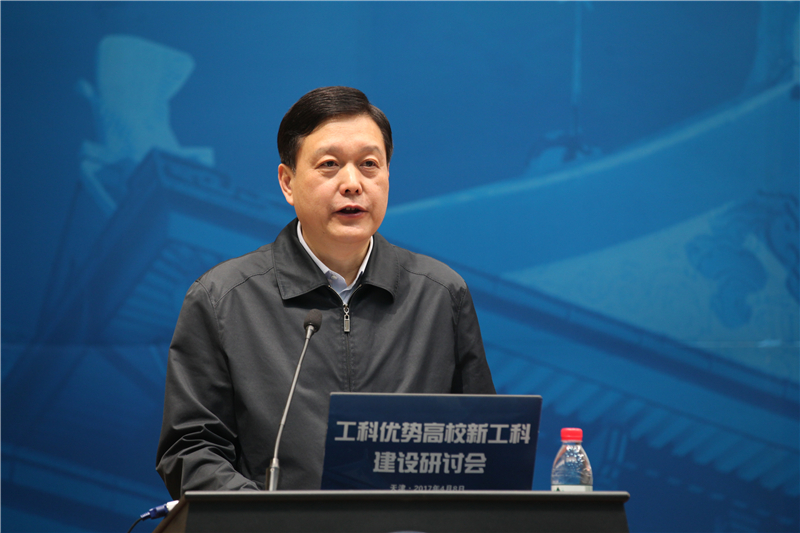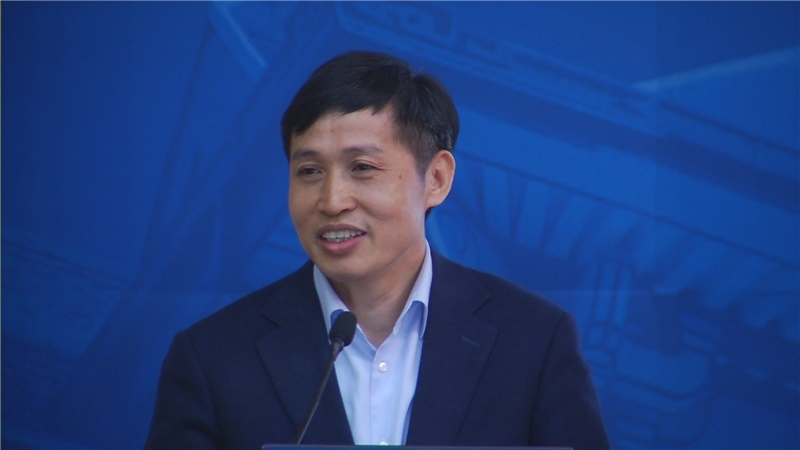On April 8, 2017, the “Innovative Engineering Education Conference for Leading Engineering Universities” was held at Weijin Road Campus, Tianjin University (TJU). The conference aimed at further deepening the reform of engineering education and promoting the construction and development of innovative engineering education. Over 200 professors and representatives from comprehensive universities and advanced engineering universities including Tsinghua University, Peking University, Fudan University, Shanghai Jiao Tong University, Tongji University, Zhejiang University, Huazhong University of Science and Technology, Dalian University of Technology, and Harbin Institute of Technology attended the conference.

Li Jiajun the Party Secretary of TJU and Wang Jing the Director of the Tianjin Municipal Education Commission made the opening statements, while Zhang Daliang the Director of the Department of Higher Education, Ministry of Education of the People’s Republic of China delivered a keynote speech. Yu Jianxing the Vice President of TJU and Wu Aihua the Director of the Office of the Science and Technology of the Department of Higher Education, Ministry of Education of the People’s Republic of China hosted the conference. Han Yun the Deputy Editor-in-Chief of the Higher Education Press also attended.

Li Jiajun the Party Secretary of Tianjin University attended the symposium and made the opening statement

Wang Jing the Director of the Tianjin Municipal Education Commission attended the symposium and made the opening statement

Yu Jianxing the Vice President of Tianjin University hosted the symposium
Zhang Daliang analyzed the latest trends in economic development, and indicated that the rapid development of the economy demands innovative engineering talents. The target of higher education in China is now transferring away from being larger to being stronger. He stressed that the construction of innovative engineering should keep in pace with the time. Besides, lots of programs are being implemented, it’s time to advance the system to put programs into effect.

Zhang Daliang the Director of the Department of Higher Education, Ministry of Education of the People’s Republic of China delivered a keynote speech
What’s more, the training of professional faculties as well as the advancement of textbooks and the improvement of teaching should be put on the agenda to refine the academic atmosphere on campus and cultivate increasing excellent students. He also pointed out that the construction of innovative engineering should focus on the national development strategy. Based on the current status quo of economic development in China, the construction of innovative engineering is supposed to be tightly connected with industrial development, speeding up the cultivation of industry talents, enhancing the ability of cooperative development, and facing international challenges with new technology and industry.
He mentioned the new construction of innovative engineering needs to be question-oriented. It should stick to the following six aspects: establish subjects based on the demands of industry; change content as technology advances; promote reforms based on the main structure of the university; alter teaching methods to match students’ interest; harness resources both at home and abroad to create ideal conditions; establish standards approaching that of the international frontier. To advance the level of China's engineering education to the top level world-wide, he continued, five “strengthenings” need to be fulfilled: strengthen the core orientation of cultivating emerging engineering talents; strength the evaluation system for first class engineering education; strengthen the responsibility for serving national strategies and regional development; strengthen the pursuit of values for making contributions to the country and society; and strengthen the goal of promoting the technological level of our nation. Finally, he summarized the target of higher education—eight paths to cultivate young talents including teaching, researching, practicing, managing, serving, nurturing, organizing and cooperating.
Zhong Denghua, academician of China Engineering Academy, the President of TJU, introduced the general achievements in engineering education. He mentioned that with dramatic advances of the economy and society and the rapid development of higher education, engineering education in China has made great progress. However, there still remain a lot of problems and challenges. He also mentioned that TJU would promote collaborative education, cultivate engineering talents who are compatible with the national development strategy, and reform the educational evaluation system. In terms of the blueprint for the construction of innovative engineering, he stated, it can be divided into three steps: explore new patterns of visionary engineering and adapt to the development of new technology, new industry and new economy by 2020; form advantages with Chinese characteristics in visionary engineering, and strengthen the ability of providing service for development spurred by innovation before 2030; shape a Chinese pattern in leading the global visionary engineering, and push forward the realization of the China Dream before 2050.

Zhong Denghua, academician of China Engineering Academy, the President of Tianjin University delivered a keynote speech

Wu Aihua the Director of the Office of the Science and Technology of the Department of Higher Education, Ministry of Education of the People’s Republic of China hosted the symposium
Yang Bin, the Vice President of Tsinghua University, and Xu Xiaofei, the Vice President of Harbin Institute of Technology, introduced the concept and practices designed to cultivate innovative engineering talents at Tsinghua University and Harbin Institute of Technology. Gu Peihua, academician of the Canadian Academy of Engineering also the Executive President of Shantou University, and Zhang Dongxiao, Dean of College of Engineering of Peking University, focused on the new patterns and plans of innovative engineering. Representatives from eleven universities including Beijing Institute of Technology, Chongqing University, Southeast University, East China University of Science and Technology, South China University of Technology, Huazhong University of Science and Technology, Shanghai Jiao Tong University, Sichuan University, Xi’an Jiao Tong University, Northwestern Polytechnical University, and Southwest Jiaotong University also shared their thinking and expectations about innovative engineering.
At the end, Zhang Daliang delivered final remarks, praising the reports and speeches in the conference. He stressed that one of the largest achievements is the “Tianjin University Plan” for the construction of innovative engineering education firstly put forward by Zhong Denghua, the president of TJU. He also gave prominence to the three steps, three arduous tasks and three breakthroughs closely related to the construction of innovative engineering. The next step, as Zhang Daliang mentioned, is that based on the conference’s conclusions, universities should combine them with practice, formulate and carry out plans. An innovative engineering system in support of the development of economy and industry is on its way.
By: Ma Zhou and Qin Mian
Editor: Yin Shiyu and Christopher Peter Clarke






